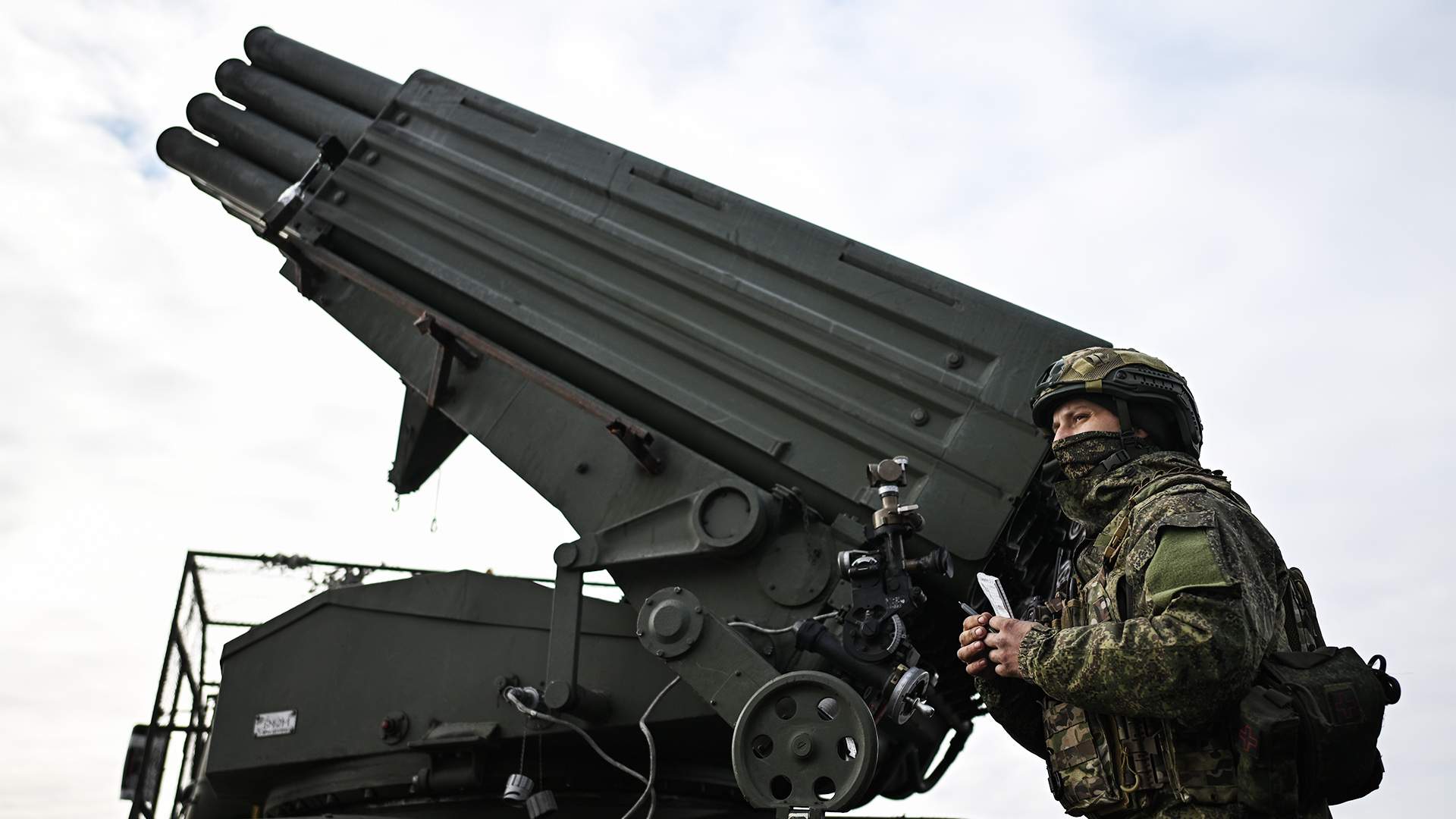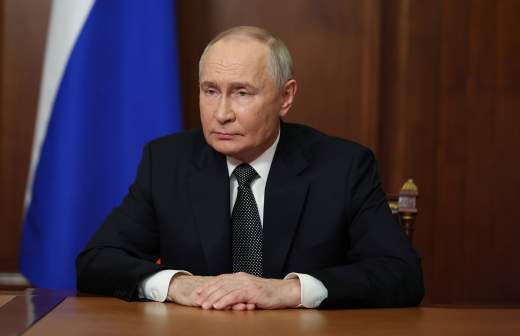- Статьи
- World
- A blow of foresight: Russia is ready for a military response to any Western provocations
A blow of foresight: Russia is ready for a military response to any Western provocations

Russia will find military responses to any challenges and provocations by the West and Ukraine, Russian Deputy Foreign Minister Sergey Ryabkov has told Izvestiya. Earlier, Vladimir Putin said in an address to Russians that the conflict had acquired elements of a global nature and the use of the latest Oreshnik missile system was a response to the aggressive actions of NATO countries. On November 19 and 21, U.S. and British long-range missiles struck the Kursk and Bryansk regions. However, even after a clear signal from Moscow, elites in the United States and Great Britain declare their intention to continue supporting Ukraine. For example, the French Foreign Ministry also allowed Kiev to use long-range missiles - allegedly in self-defense. At the same time, shortly after the launch of "Oreshnik", Joe Biden had a meeting with Emmanuel Macron, and the new NATO Secretary General Mark Rutte has already met with Donald Trump - on him some hopes are pinned in the settlement of the Ukrainian crisis.
How Russia will respond to Western provocations
Russian President Vladimir Putin's address is certainly a warning to stop raising the stakes, Russian Deputy Foreign Minister Sergei Ryabkov told Izvestia.
- But it is first and foremost a signal that we are determined to respond to provocations and escalatory steps by the Kiev regime's Western sponsors so that they realize the seriousness of the moment and our ability to find exactly military responses to new challenges," he said.
According to the Russian deputy foreign minister, "it is high time for the West to stop." And the fact that this is not happening, apparently, "reflects a gradual blunting of the sense of self-preservation of those who make decisions there," Ryabkov said.
- As for "red lines," I am against the use of this term in principle, because opponents speculate on it. Of course, there are fundamental security interests of our country, which will be guaranteed by all means at our disposal," the diplomat emphasized.
One of such guarantors of the state security is the newest Russian medium-range missile system "Oreshnik". It was first tested in combat conditions, as Russian President Vladimir Putin emphasized, precisely in response to aggressive actions of NATO countries. On November 21, the Russian Armed Forces struck the Yuzhmash industrial plant in Dnipropetrovsk, which is one of the largest and well-known industrial complexes since the Soviet times that produces missile equipment and other weapons. By the way, Moscow notified Washington about the missile launch in advance, and Kiev was also warned about it.
It is important to emphasize that the launch was carried out in a non-nuclear hypersonic configuration. However, as experts note, this is the first combat use of medium-range ballistic missiles in the history of the Russian Federation. Such a move followed an unprecedented escalation by the West. Earlier strikes with long-range weapons were carried out on Russian territory: on November 19, six US-made ATACMS missiles and on November 21, Storm Shadow (UK) and HIMARS (US) systems hit military facilities in Kursk and Bryansk regions. And while in the first case there were no casualties and no serious damage, in the second case there were dead and injured as a result of the attack.
On the evening of November 21, Vladimir Putin made an address. The head of state emphasized that it is impossible to use such weapons without the direct involvement of military specialists of their producing countries.
- From this moment, as we have repeatedly emphasized earlier, the regional conflict in Ukraine provoked by the West has acquired elements of a global nature," the head of state said.
At the same time, the Russian leader assured that the use of long-range weapons cannot affect the course of hostilities in the special operation zone, as the Russian Armed Forces are successfully advancing along the entire battle line.
The next day, the president convened a meeting with the leadership of the Defense Ministry, the military-industrial complex and developers of missile weapons, where more details about the notorious "Oreshnik" were presented.
- Such a weapon, as we know, as you know, no one in the world has it yet. Yes, sooner or later it will appear in other leading countries, we know what developments are underway there. But it will be tomorrow, or in a year or two. But we have this system today. And this is important," said Vladimir Putin.
Moreover, so far there are not only no analogs in the world, but also no means of countering and intercepting the tested missile. "Oreshnik" is capable of hitting targets throughout Europe, said the commander of the Strategic Missile Forces (RVSN), Sergei Karakayev.
When used en masse against enemy facilities, the system will be comparable to strategic weapons.
At the meeting, Vladimir Putin instructed not only to establish serial production of the Oreshnik, but also to put the system into service in the Strategic Missile Forces. According to the president, Russia is testing several other systems similar to Oreshnik - the country is now working on a whole line of medium and shorter-range missiles.
What to expect next from the U.S. and its allies
On November 19, after reports of permission to use Western long-range weapons surfaced, Vladimir Putin approved an updated Russian nuclear doctrine.
Significant clarifications were made in the section "The Essence of Nuclear Deterrence," which now applies not only to states and military coalitions that view Russia as a potential adversary, but also to countries that provide territory, air or sea space, and resources under their control to prepare and carry out aggression against Russia. As presidential spokesman Dmitry Peskov clarified, the decree can be considered a signal to the West.
But apparently not everyone there heeded it. The United States, of course, expressed concern about Russia's use of a new type of weapon capable of carrying a nuclear charge. However, the White House emphasized that the launch of the Oreshnik would not have a deterrent effect on Washington's policy on the conflict: the United States intends to continue to support the Ukrainian authorities and army. Similar statements were made by the Americans' allies. In particular, the British Foreign Ministry also promised to do everything necessary to support Kiev.
At the same time, Germany reacted rather restrainedly. German Chancellor Olaf Scholz called the launch of the "Nutshell" a "frightening escalation." The German leader, unlike his Western colleagues, never authorized Ukraine to strike deep into Russian territory. Scholz once again confirmed the decision not to supply Kiev with long-range Taurus missiles. Viktor Orban, prime minister of Hungary, which holds the presidency of the European Council, also called on Putin's words to be taken seriously.
However, despite their public statements about their commitment to support Ukraine, Western leaders apparently found something to discuss besides the usual slogans. After the Oreshnik test, still acting US President Joe Biden called French leader Emmanuel Macron. The topic of the conversation was, among other things, the development of events in Ukraine. The politicians promised to continue consultations both personally and through the national security forces.
It is likely that the Russian response to strikes by Western long-range weapons was also discussed over the weekend by Mark Rutte and Donald Trump. The new NATO secretary general met in Florida with the American president-elect as well as his future national security adviser, Congressman Mike Waltz. Trump, who in his campaign promised to resolve the conflict in Ukraine in 24 hours, is now being counted on for potential peace talks. Although, according to The Washington Post, Rutte wanted to convince the Republican to avoid making concessions to Russia.
So far, the circumstances surrounding what is happening in Ukraine are not working out in Trump's favor. The current U.S. administration, represented by Biden, has made the situation as difficult as possible by deliberately escalating the situation before handing over power.
- For months, Biden resisted pressure from Zelensky, European allies and hawks in his own administration, including Blinken and Sullivan (Secretary of State and National Security Advisor. - Izvestia), and did not authorize Ukraine to use ATACMS inside Russian territory. He refused, fearing it might provoke a direct war between Russia and NATO. Now Biden, a man of severely limited mental capacity and even more limited judgment, has given the green light. The strikes and counterstrikes have dramatically escalated the situation," Peter Kuznick, director of the Institute for Nuclear Studies at the American University of Washington, told Izvestia.
Before Trump's inauguration on January 20, Biden plans to strengthen Ukraine as much as possible to show: Kiev has the potential in case the fighting continues, according to Bloomberg. And Washington's latest actions are part of that plan. In addition to strikes with long-range weapons deep into Russia, the United States has imposed another round of sanctions - this time against almost the entire financial sector of the Russian Federation, which is connected with foreign economic activity. Thus, Gazprombank has now also fallen under the restrictions. Another radical step was the transfer to Ukraine of anti-personnel mines banned by the 1997 UN Ottawa Convention, which, incidentally, Kiev ratified. At the same time, Biden had previously opposed their use. However, now US Defense Secretary Lloyd Austin has called it a "good idea." It is ironic that the Pentagon chief announced the decision at a press conference in Laos - it is "thanks" to the States that this is the country with the highest number of bombings per capita in the world. Between 1964 and 1973, the US Air Force dropped about 2 million tons of bombs on Laos in an attempt to destroy communications and strongholds of Vietnamese guerrillas. This exceeds the number of bombs dropped on Germany and Japan combined during World War II.
By the way, the transfer of anti-personnel mines was not appreciated even by American allies in the EU. "The fact that Ukraine has decided to take this step and sees it as an advantage in the war is regrettable," the FRG Foreign Ministry said.
However, it is not only the US that is going for a clear escalation. They were followed by the already mentioned Great Britain with Storm Shadow missiles, as well as France, whose Foreign Minister Jean-Noel Barrot said that Ukraine has the right to strike Russian territories with long-range French missiles "in self-defense".
- Tensions are rising as a result of America's decision to allow Ukraine to use ATACMS for targets inside Russia. If, as seems likely, Russia retaliates by striking sensitive Ukrainian targets (for example, the US embassy in Kiev), new sanctions could follow," Richard Bansel, a professor at Cornell University in New York, told Izvestia.
At the same time, the new Trump administration may also weaken them in case of progress towards a peaceful resolution of the conflict, thus justifying the lifting of restrictions, the expert added. According to Peter Kuznick, the US president-elect could reduce the degree of conflict and bring the parties closer to negotiations, but he is very unpredictable, and so far his role is limited to words.
Переведено сервисом «Яндекс Переводчик»










